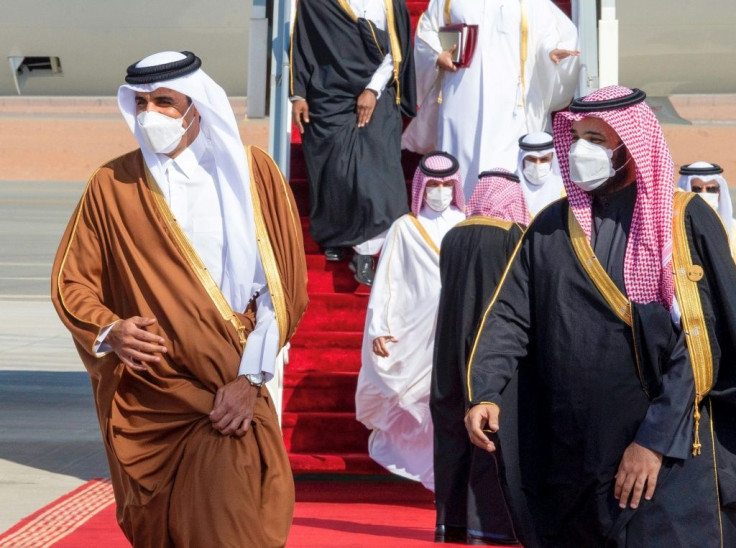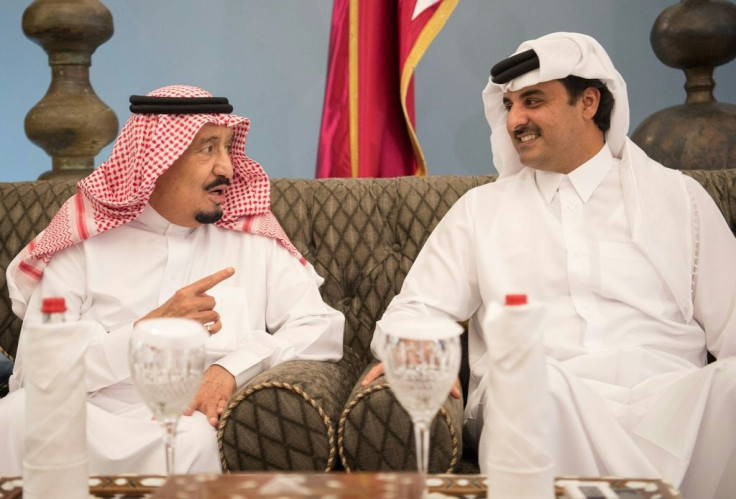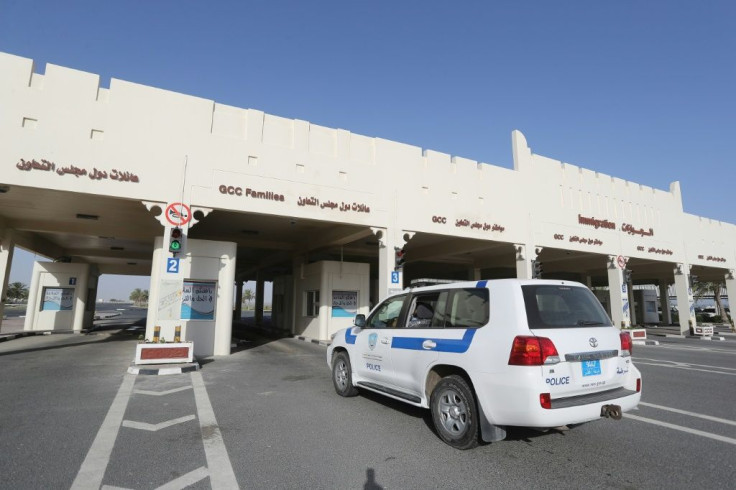Gulf Rivals Reconcile At Saudi Summit, Ending Long Rift
Saudi Arabia and its allies have restored full relations with Qatar, Riyadh said Tuesday after a landmark summit, ending a damaging rift that erupted in 2017.
Four nations, led by Saudi, cut ties and transport links with Qatar in June that year, alleging it backed radical Islamist groups and was too close to Riyadh's rival Iran -- allegations Doha denied.
Saudi said that the United Arab Emirates, Bahrain and Egypt were joining it in re-establishing ties with Qatar, whose ruler was greeted with a warm embrace on arrival in the kingdom by Crown Prince Mohammed bin Salman.
"What happened today is... the turning of the page on all points of difference and a full return of diplomatic relations," Saudi Foreign Minister Prince Faisal bin Farhan said following the summit in the desert city of Al-Ula.
Leaders of the six-nation Gulf Cooperation Council (GCC) signed two documents on Tuesday, the Al-Ula Declaration and a final communique, described by Prince Mohammed as affirming "our Gulf, Arab and Islamic solidarity and stability".

He called for unity to confront challenges facing the region, singling out "the threats posed by the Iranian regime's nuclear and ballistic missile programme and its plans for sabotage and destruction."
Iran's Foreign Minister Mohammad Javad Zarif later took to Twitter to offer "congratulations to Qatar for the success of its brave resistance to pressure and extortion".
"To our Arab neighbours: Iran is neither an enemy nor threat. Enough scapegoating -- especially with your reckless patron on his way out," Zarif added, an apparent reference to outgoing US President Donald Trump, an Iran hawk whose mandate ends on January 20.
The GCC consists of three of the countries that boycotted Qatar - Saudi, the United Arab Emirates and Bahrain -- neutral Oman and Kuwait, and Qatar.
Prince Mohamed, Saudi Arabia's de facto leader, extended an enthusiastic welcome to Qatar's Sheikh Tamim bin Hamad al-Thani, after the emir landed in the kingdom for the first time since the crisis began.

Sheikh Tamim was whisked with the other leaders through Al-Ula's dramatic Martian-like landscape to the shimmering Maraya Concert Hall, a mirrored structure situated in a nearby valley.
Later, Saudi state media tweeted a photo of the young Saudi leader behind the wheel of a sports utility vehicle, taking Sheikh Tamim on a tour of the area.
Washington had intensified pressure for a resolution to what Doha called a "blockade", insisting Gulf unity is necessary to isolate US foe Iran as the curtain falls on Trump's presidency.
Jared Kushner, Trump's son-in-law and senior adviser who shuttled around the region to seek a deal, attended the signing in Al-Ula.
"The Trump administration will claim this as another victory for sure," said Royal United Services Institute analyst Tobias Borck.

Drivers south of Doha on the usually calm Salwa highway towards the Saudi border at Abu Samra sounded their horns and waved their arms from their car windows, an AFP correspondent reported.
"We will see all Saudis here, also all Qataris will visit Saudi Arabia, and we will be friends as we were before and better," said Doha-based Hisham al-Hashmi, a Qatari with an Emirati mother, who wore a traditional thobe and winter headdress.
Saudi media, which is influential throughout the region, quickly adopted a pro-unity tone in stark contrast to scathing past coverage of Qatar.
Qatar-based broadcaster Al-Jazeera's coverage of Saudi Arabia was also markedly more muted than in recent years.
Meanwhile a Qatari business delegation flew from Saudi to Cairo to open a luxury hotel in the Egyptian capital.
The Saudi-led GCC hawks, along with Egypt, in 2017 closed their airspace to Qatari planes, sealed their borders and ports, and expelled Qatari citizens. An information battle raged online with the two camps trading barbs, deepening the resentments.
Some observers had warned that the UAE could be the spoiler for reconciliation attempts, having heaped criticism on Qatar.
However, Prime Minister Sheikh Mohammed bin Rashid al-Maktoum, who is also the ruler of Dubai, said the summit had brought unity to the region.
"The changes and challenges surrounding us require strength, cohesion and real Gulf cooperation," he tweeted.
The UAE and Qatar in particular remain divided over Doha's perceived support for movements aligned to the Muslim Brotherhood and the two countries' backing for rival groups in Libya's conflict.
"The crisis played a major role in redefining existing partnerships and forging new ones," said Saudi researcher Eman Alhussein, a non-resident fellow at the Arab Gulf States Institute in Washington.
"As a result, it will be unlikely to see things change to how they were before the crisis," she added.
The diplomatic freeze only served to make Qatar more self-sufficient and push it closer to Iran, hurting Saudi's interests, observers say.
At the start of the crisis, the boycotting countries issued a list of 13 demands to Doha, including the closure of Al-Jazeera and the shuttering of a Turkish military base in Qatar.
Qatar has not publicly bowed to any of the demands.
© Copyright AFP {{Year}}. All rights reserved.





















